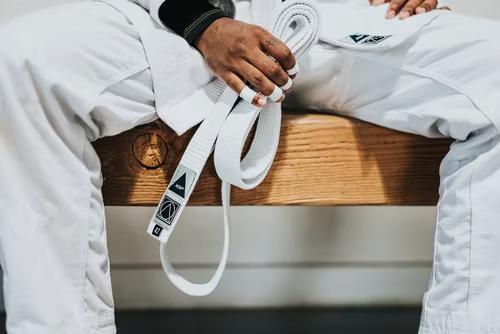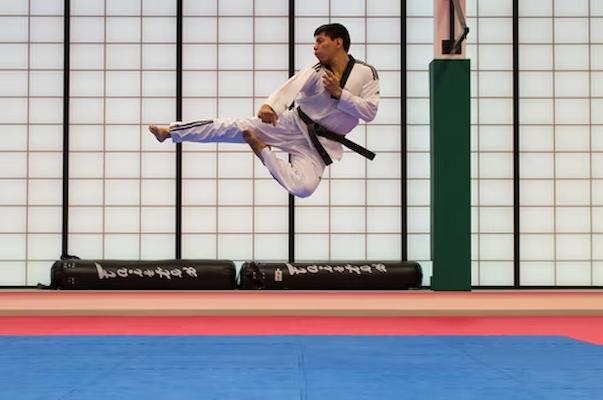In the past, learning the next technique to practice required YEARS of training with a reputable teacher in a traditional dojo. We can now research and access karate resources from instructors around the globe thanks to the instantaneous availability of digital information.
You can practice anywhere, at any time, with the addition of uploaded training videos and live video conferencing via mobile phone, tablet, and web cameras.
Learning Karate At Home Takes Longer, Right?
Because some moves will be more challenging to perform and perfect without a partner, learning karate at home does take longer. Additionally, the absence of direct criticism from an experienced teacher increases the risk of developing bad habits that will take longer to break.
However, it takes years of practice, commitment, and time to truly become an expert in anything. Therefore, learning karate on your own through YouTube videos or live online classes is the same.
However, it will be difficult to tell if you’re mastering the techniques or if your advancement is merely a product of your imagination.
You’ll need to be precise and slow because it’s difficult for you to determine your level of success or the most important techniques to begin with.
As many martial arts masters will tell you, “The difference between flow and slowness is speed.
That means that whether you train in a dojo or not, you shouldn’t try to rush your preparation. Move slowly and give yourself plenty of time to fully comprehend and feel the movements. Over time, speed will develop. However, rushing will only make you sloppy, at best.
If you don’t, you might discover months from now that you rushed through the most important fundamental, which could later slow your growth.
If you have access to a top-notch dojo and are committed to training at least three times per week, it would take you (at the very least) five years of study to obtain a black belt. And you should avoid anyone who promises to get you a black belt quickly.
However, you can still achieve great success at home. You must eventually enroll in a dojo, though, in order to truly master it and probably earn a black belt.
Why Learn Karate?
An Asian martial art called karate was created in the Ryukyu Kingdom. Its philosophy is more based on the development of defensive and offensive movements, and it’s great for balancing the body and the mind. Karate came from a combination of two words, kara meaning empty and te which means hands, empty hands which reflects its main essence which is an ultimate way of life that goes well beyond self-defense applications.
Learning karate at home is possible, whether it’s for fitness or self-defense. You can find many online karate lessons, some of which are for a fee and others of which are available for free. The best martial art or niche for you, however, must be determined before you begin learning karate.
Martial arts are divided into various genres, just like music. If you’re into ballads, you can’t just sing a rock song and expect to give the song its proper justification. There are countless variations of karate, and each has its own unique features. Although it is safe to assume that they all share some similarities, each of them has its own set of guiding principles. Your ability to succeed in your endeavor may depend largely on your ability to comprehend these principles.
Making a choice among the various Karate styles might be confusing for beginners. The list includes Shotokan, Goju-Ryu, Uechi-Ryu, Shitoryu, and others.
Finding the ideal niche for you might be as challenging as searching through a crowded room for a needle. (Trust me, it’s challenging!)
By providing you with 5 crucial and simple steps to learn karate at home alone, we’ve made your martial arts journey simpler. These recommendations are for you if you struggle.
How To Learn Karate At Home
Learning Chinese martial arts or Japanese martial arts on your own could not be easier thanks to the abundance of resources that can be found online. There will, of course, be a few, manageable challenges, just like with any other project.
The following 5 steps will unquestionably aid you in learning karate.
1. Identify Your Niche
Most advice that you’ll get from the internet would be to get a space where you can practice or to clear your mind from thoughts but essentially, before actually going there, shouldn’t you first identify which niche you are more leaning to? Yes, this could become complicated, but identifying the style of karate about which you are most enthusiastic will make the transition to taking online karate lessons go more smoothly. Time and resources can be saved in this way. You can begin by reading through various forms of karate to find your niche. Usually, learning about various forms of karate through reading or watching can give you a good idea of which fighting techniques will be simpler for you to master should you decide to give them a shot.
2. Gather Resources
And by gathering resources, we mean looking for online karate lessons or sessions. You can choose between receiving paid or free training. The best lessons to find are those that instruct you in karate or martial arts basics. Finding one will be simple because there are many online lessons and resources available. Despite this, you must acknowledge that not everything you find online can be used. Some things can only be learned from a true master, so keep that in mind. If you’re serious about learning karate at home, you should take these factors into account.
3. Fundamentals are Everything
At-home karate instruction focuses more on familiarizing the fundamentals. In everything we do, it is simpler if we start with the basics before moving on to the more difficult ones. A solid karate foundation guarantees more efficient learning. There is no shortcut to learning, and mastering the fundamentals is essential if you want to succeed. You can’t just ignore this, I repeat.
Assuming you have all the tools you need to get started and have finally found your niche, the next step is to put the fundamentals into practice. Warming up, stretching, and meditation are some examples. These are all crucial for establishing a solid foundation in karate or other martial arts. Without these, it would be similar to going into battle without the proper preparation. You’re going to fail, or you’re going to fail pretty easily.
4. Follow Your Karate Lessons
Only a small number of the martial arts lessons available online can actually teach you karate, despite the fact that there are many of them. However, you will undoubtedly learn at least a few things by attending these sessions.
Being proficient in karate requires more than just knowledge. There may be many reasons why you decided to learn karate at home, but the lessons you receive online may be somewhat constrained or different from those you would receive in dojos or in-person classes.
Try your best to adhere to and internalize the lessons presented in karate videos or tutorials. Self-taught karate has some limitations, but you can still use it for self-defense, and if you practice it regularly, you can get better over time.
5. Practice all the Kata Again and Again
Although nobody is perfect, it’s still beneficial to repeatedly practice the katas you’ve learned because practice makes perfect. You’ll practice them in your dreams after doing them repeatedly.
The knowledge of all the katas alone is insufficient. You must memorize them as well. Not only are you applying them to your life, but you are also learning them so that you can call yourself a karate expert. The fundamentals of karate and how it affects your physical and mental makeup. You must memorize all of these things in order to master them soulfully.

How Long Does It Take To Become Proficient In Home Karate?
It would take at least six months to learn the basics of karate at home. When training three times a week for an hour each time, it would take at least another 6 to 12 months to become proficient in them.
It takes a long time.
Naturally, the length of time required varies from person to person. It depends on your level of commitment, how frequently you practice each week, the caliber of the instructions, and your attitude as well.
It’s entirely possible to master the techniques fast, but the person could be slowed down if they have the wrong mindset.
A good instructor takes care of both.
Take note of the word “fundamentals” I used. Spend about the same amount of time (in addition to your self-study) in a reputable dojo, learning from an experienced instructor, to really become good at it—by that, I mean to be able to defend yourself in a street fight.
Conclusion
I discussed ideas for learning karate at home in the sentences that came before.
We considered how long it would take you and whether it would be wise to pursue a black belt through independent study. The length of time it would probably take you to become proficient on your own was my final point.
Fortunately, solo movements like katas and all the different blocks can be learned much more quickly at home than drills that call for a partner.
Therefore, think of the self-study phase as a “better than nothing” tactic.
But don’t expect to become good by watching some videos; that’s just a passing thing. The best way to learn anything, including karate, is in a dojo with other students and a master instructor.
The cost must also be considered before making a choice, though. Karate, among other martial arts, can be costly when practiced in person. Therefore, before enrolling, make sure you are aware of all the costs.

